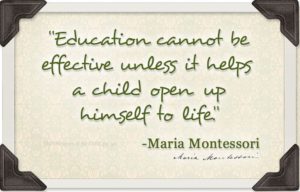What is Montessori Education
The Montessori method of education is based on the observations and discoveries of Italian physician and educational pioneer, Dr Maria Montessori (1870-1952).
Montessori is a method of education that is based on self-directed activity, hands-on learning and collaborative play. In Montessori classrooms children make creative choices in their learning, while the classroom and the highly trained teacher offer age-appropriate activities to guide the process. Children work in groups and individually to discover and explore knowledge of the world and to develop their maximum potential.
The children choose their activities independently and move from one to the next at their own pace. A calm, peaceful atmosphere is maintained to permit concentration for surprisingly long periods of time. The child’s innate passion for learning is encouraged by providing opportunities to engage in spontaneous and purposeful activities.
Each child is carefully observed and guided by a trained adult who presents materials incrementally as the child reaches developmental readiness. Children naturally cultivate individual work patterns, and are thus encouraged to work at their own pace. The trained adult does not teach the child, but rather puts him/her in charge of his/hers own learning through fostering his/hers exploration.
THE MONTESSORI CLASSROOM
Easily accessible and available equipment
Freedom of movement within the prepared environment and to make choices
Personal ownership, with responsibility, and respect for the environment, adults and peers
Learning from real experience and the natural environment
An aesthetically pleasing and harmonious classroom making it a joy and pleasure.
THE MONTESSORI CURRICULUM
There are eight key stages of development in our curriculum:
Practical life
This stage in our curriculum establishes a link between the home and nursery. The various activities carried out by the children teach them how to care for their environment and to contribute towards the cultural and social life of the classroom. Everyday living activities aid the children’s intellectual growth and develop their co-ordination in movement, balance and grace.
These activities are divided into four main areas:
- Activities for refinement of movement – such as pouring, transferring, cutting, gluing, folding, opening and closing and threading.
- Activities for care of the environment – such as sweeping, polishing, dusting, putting their activity away and watering the plants.
- Activities for care of self e.g. washing hands, blowing nose, putting on simple clothing, preparing snack.
- Activities for promoting grace and courtesy such as greeting visitors.
All the above will perfect skills that will aid to the child’s independence.
Communication and language
This stage of development involves providing children with opportunities to experience a rich language environment. The Montessori language materials are extensive and assist the children to develop confidence and skill in expressing themselves, and to speak and listen in a range of situations. It also prepares them for writing.
Sensorial materials
A child’s first learning experiences are achieved through their senses of touch, taste, smell and hearing. The sensorial materials provide opportunities to use these senses. They develop the children’s level of observation and discrimination, and increase their vocabulary
Mathematics
Mathematics involves the introduction to pre-maths concepts such as sorting, matching and counting. The Montessori maths materials offer a systematic approach to learning through the use of objects, while slowly helping the child in understanding and using numbers, calculating simple addition and subtraction problems, and describing shapes, spaces and measures.
Literacy
Literacy development involves teaching and encouraging children to link sounds and letters and to begin to read and write. The children have access to a wide range of materials to support their development in this area.
Understanding the world
This area of development offers opportunities for the children to explore a wide range of topics through activities and materials based on real-life experiences. They are able to make sense of their physical world and their community by further exploration and investigation during our many educational trips.
Physical
This development takes place through activities such as dancing and drama. We invite specialists to lead music and drama activities with the children.
Expressive arts and design
Children are given opportunities to use and experiment with a wide range of media and materials. They are also encouraged to share their thoughts, ideas and feelings through a variety of activities in art, music, movement, dance, sports, role play and design and technology.
